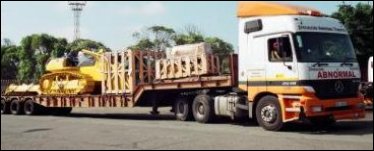How to Prevent Accidents with Trucks and Trailers
 AS a truck driver the load you carry is largely your responsibility. It is
not only poor driving and road conditions that can cause accidents, but also the
load you haul. Overloading, improperly secured goods and loads that shift, such
as liquid in tanks, can all affect the degree of control you have over your
heavy vehicle. AS a truck driver the load you carry is largely your responsibility. It is
not only poor driving and road conditions that can cause accidents, but also the
load you haul. Overloading, improperly secured goods and loads that shift, such
as liquid in tanks, can all affect the degree of control you have over your
heavy vehicle.
We have all seen fully laden trucks lying ungracefully on their sides on busy
highways. And how often have we tried to work out, unsuccessfully, how it could
have happened. In some instances, the very way in which the goods were loaded
was a direct cause of the vehicle toppling. Also be wary on farm roads. These
roads may carry few vehicles but the nature of the terrain can pose problems. So
make sure you load right. It could save your life and that of other road users.
Some causes of truck accidents
- Backing into a person or object
- Improperly secured goods
- Overloading: it puts an additional strain on the brakes and tyres. Towing a
trailer with a weight heavier than the towing vehicle can lead to loss of
control, especially downhill
- Driving too close to ditches, slopes and on soft shoulders, especially on
country roads
- Driver fatigue, poor brakes, and non-functioning signal lights, unroadworthy
vehicles
- Carrying loads that shift weight such as livestock and liquid in containers.
This can happen when turning corners and making sudden swerves
Some ways to prevent truck and trailer accidents
- Be alert, obey road rules, maintain your vehicle in a roadworthy condition,
and donít drive when feeling sleepy
- Take frequent breaks, and when you do, do stretching and breathing
exercises. Also walk around the truck and drink coffee or soup to overcome the
drowsy feeling
- Keep in mind that a loaded truck takes longer to stop and to get up to
highway speed
- Check your blind spots especially when changing lanes and turning
- Hoot when reversing to draw the attention of people near your vehicle or
get out of your cab to check if itís safe. It is better to have someone
directing you when reversing
- Use wheel chocks to prevent the truck from moving while loading
- Never overload because it not only makes it difficult to steer, but also to
stop
- Donít load too high because the load may not clear overhead obstacles
such as power lines and bridges
- Be aware of the type of cargo you are transporting and the way it is likely
to behave in the event of your going downhill or having to make sudden turns
- Load and unload cargo using a reliable and solid loading ramp
Some points about trailer safety
- If the trailer has brakes, inspect them frequently
- The trailer must be secured properly to the towing vehicle. Also check
the signal lights
- Inspect the tyres regularly and lubricate the wheel bearings
- Lock the brakes before unloading, and load and unload on level ground
- Ensure that the trailer is properly loaded. Place about 60 per cent of
the load in front
- Donít overload a trailer
- When towing a trailer down a hill, use the same gear and speed as when
going up a hill
- Check your load regularly during a trip to ensure that the load has not
shifted

Related Topic
Safe loading is a must for
trucks

 back back
|
 AS a truck driver the load you carry is largely your responsibility. It is
not only poor driving and road conditions that can cause accidents, but also the
load you haul. Overloading, improperly secured goods and loads that shift, such
as liquid in tanks, can all affect the degree of control you have over your
heavy vehicle.
AS a truck driver the load you carry is largely your responsibility. It is
not only poor driving and road conditions that can cause accidents, but also the
load you haul. Overloading, improperly secured goods and loads that shift, such
as liquid in tanks, can all affect the degree of control you have over your
heavy vehicle.